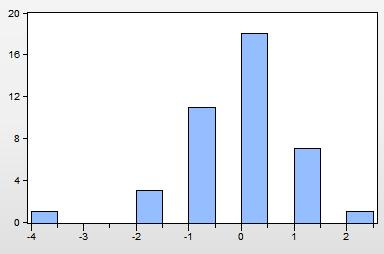Scoring Your Ukraine Predictions
I just reviewed all 50 responses to my original Ukraine prediction challenge. Seven comments did not make unconditional predictions, and two were obvious jokes. Here’s how I scored the remaining 41 sets of predictions:
1. My last post named six major facts about what happened during the last year:
About 6,000 have been killed.
Russia has formally annexed Crimea, but not officially declared war on Ukraine.
Russia has covertly sent thousands of Russian soldiers into Ukraine, but less than ten thousand.
Real GDP growth was slightly over 0% in Russia and under -5% in Ukraine.
So few NATO troops have been killed that no statistics for NATO fatalities in Ukraine google.
Despite several peace deals, fighting continues.
2. Responses got one point for correctly predicting each of these facts.
3. Response lost one point for predicting anything contradictory to each of these facts.
4. Responses were neither rewarded nor penalized for failing to address these six points, or for making other predictions. My apologies to everyone who made correct predictions I didn’t score; many made good points, but I wanted to keep scoring simple and consistent.
5. I tried to grade the responses blind, but only via deliberate inattention rather than a serious blinding protocol.
The resulting histogram has a mean of -.29 and a standard deviation of 1.08, with a maximum of +2 and a minimum of -4.

The winner of the Ukraine Prediction Challenge was Hansjörg Walther, with a score of +2 out of a possible +6. His original forecast:
My prediction is very similar to David Friedman’s:
– Russia will secure control of the Crimea (or already has).
– There are protests from Western governments, but nothing serious.
– Then a deal is brokered to let people in the Crimea vote on staying
within Ukraine or joining Russia, which is easy to sell as
self-determination.
– And the probable outcome would be that the Crimea accedes to Russia.Putin will not try to gobble up Eastern Ukraine or even Ukraine as a
whole. That would be a precedent where Western governments would get
nervous (although even in this case my guess is that it would be just
talk, but a higher risk something goes wrong).And then there is no clear-cut line where to cut up Ukraine. For the
Crimea there are rather recent borders you can refer to. With many
people in Ukraine who are favorable to Russia, Putin has much more
leverage than otherwise. And he would have a chance to influence
Ukrainian politics again. With a split, he would create a second Poland
that is headed for the EU and hostile to Russia.
I gave Walther one point for calling the formal annexation of Crimea, and another point for predicting no action by Western governments serious enough to lead to NATO fatalities, with zero lost points for contradicting any of the the other four major facts.
I suspect that Tetlock will not be surprised by the results. If he’d like to comment, you’ll be the first to know.
The post appeared first on Econlib.

